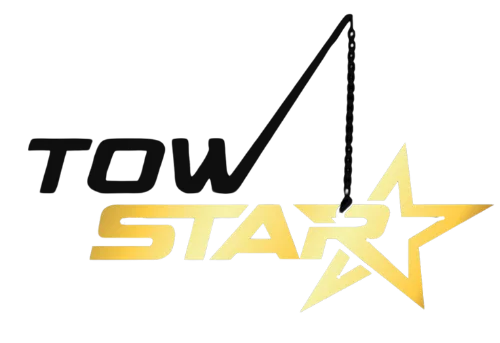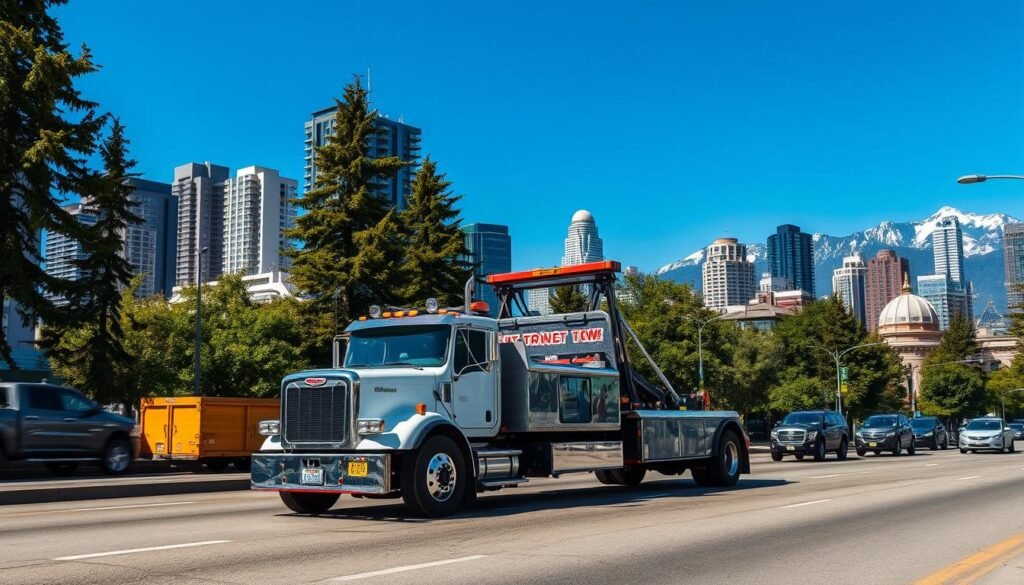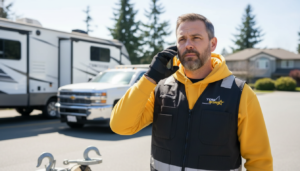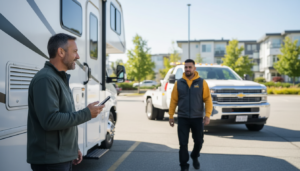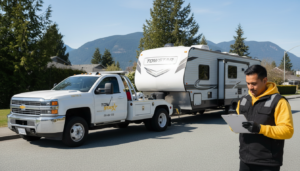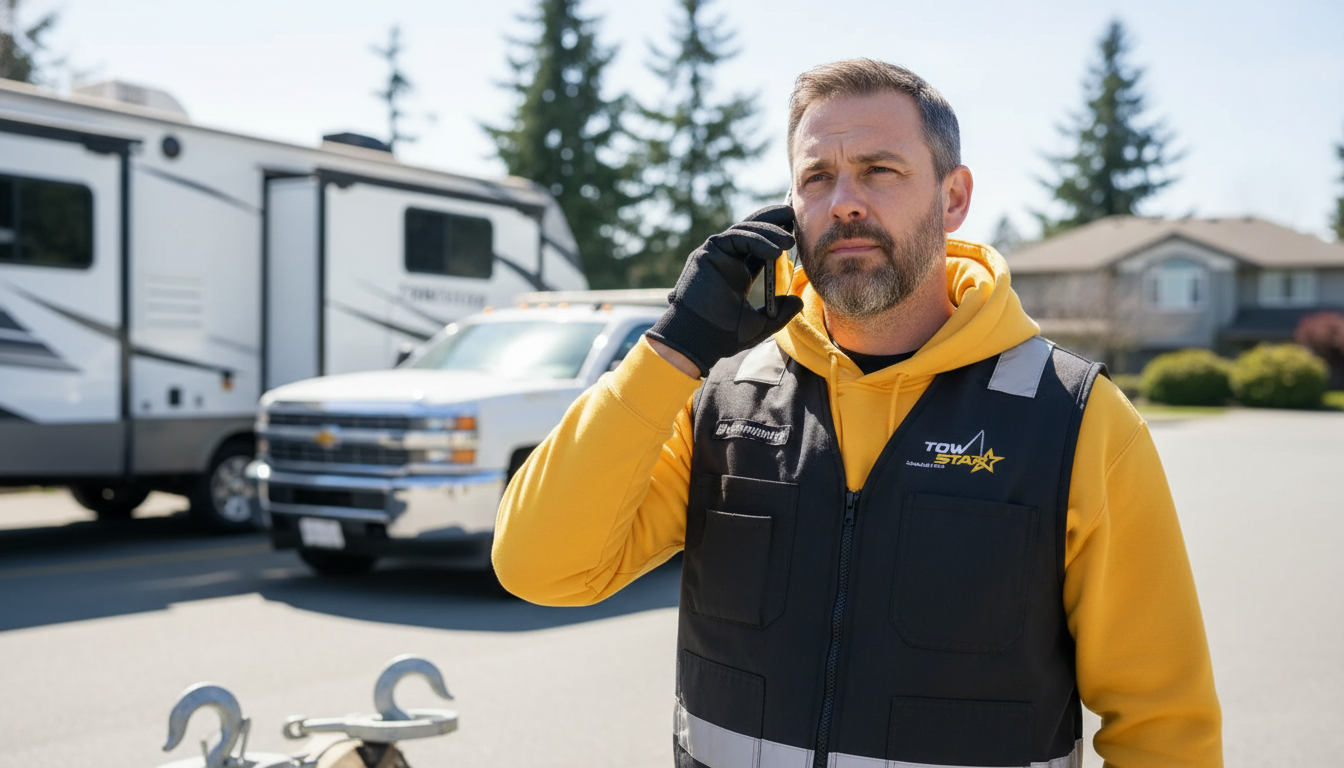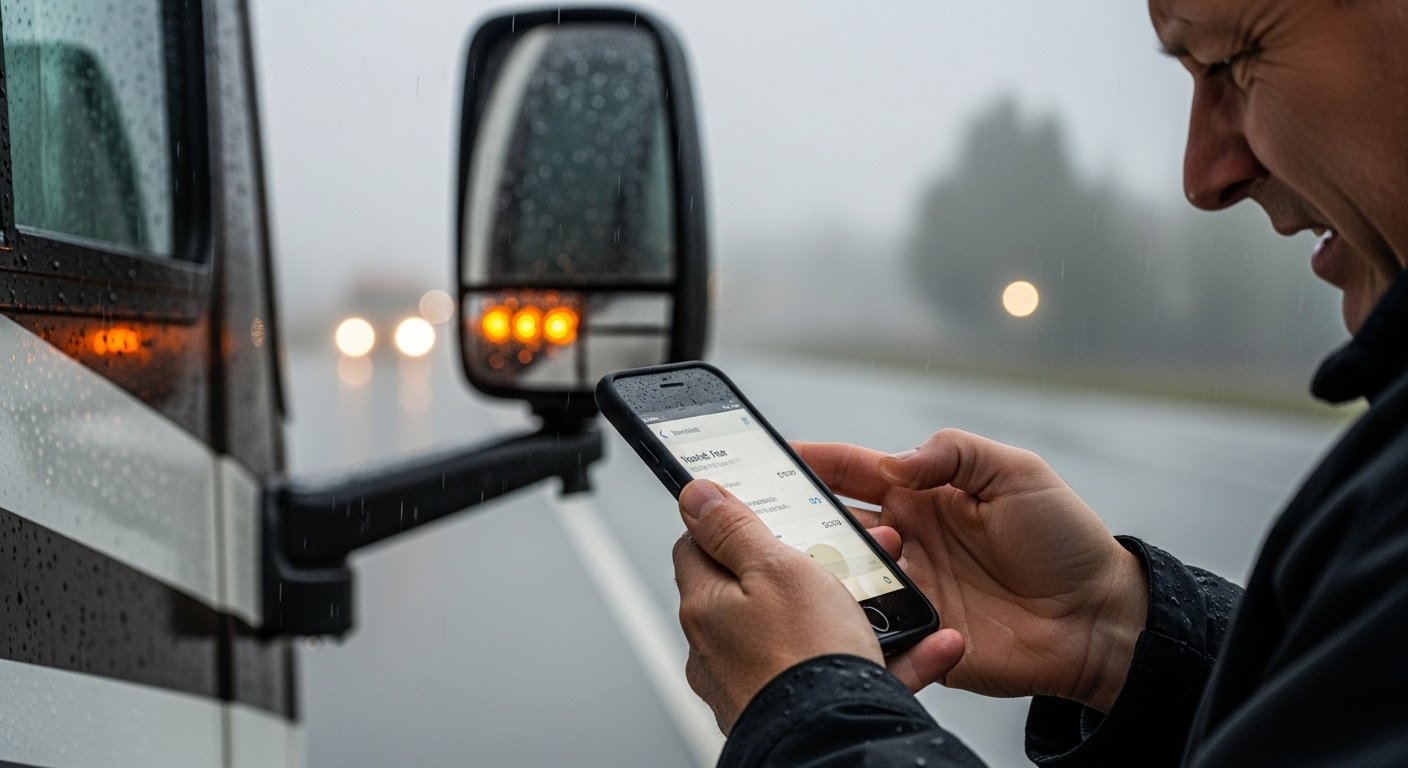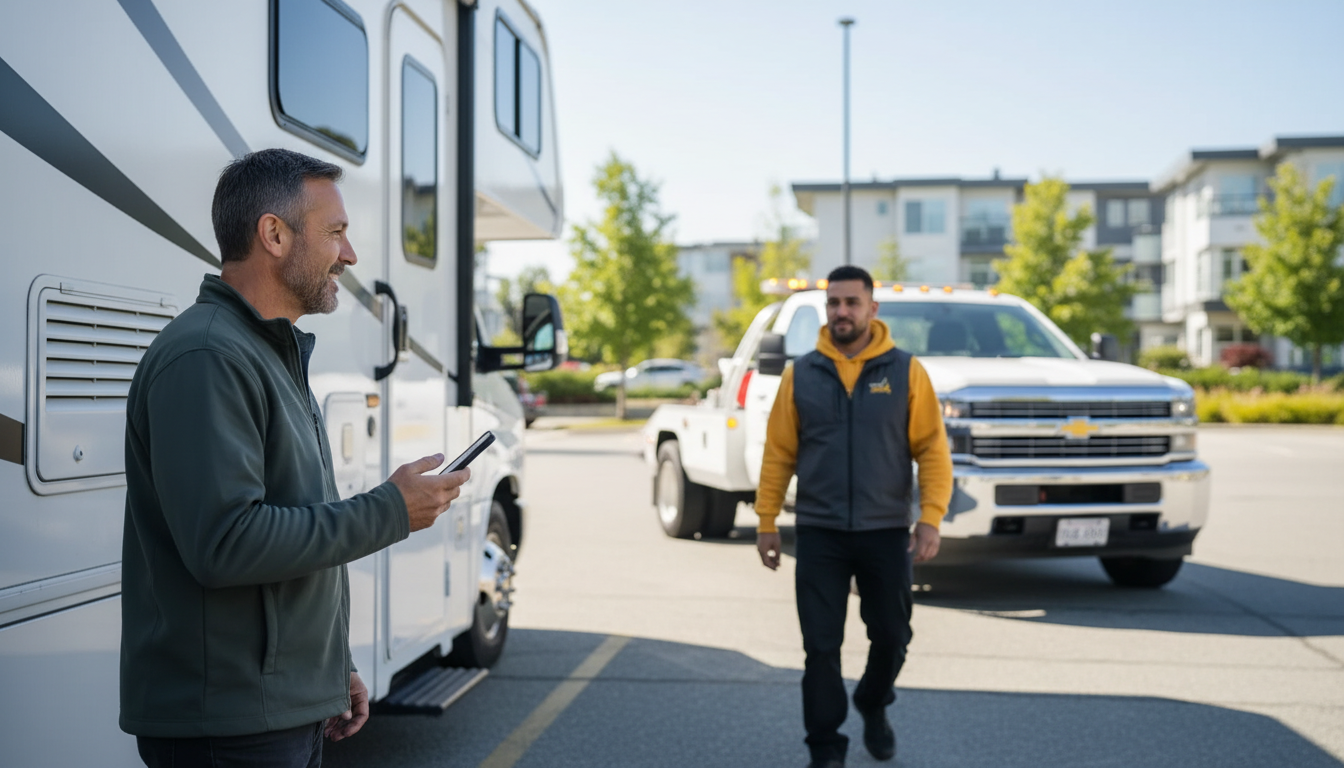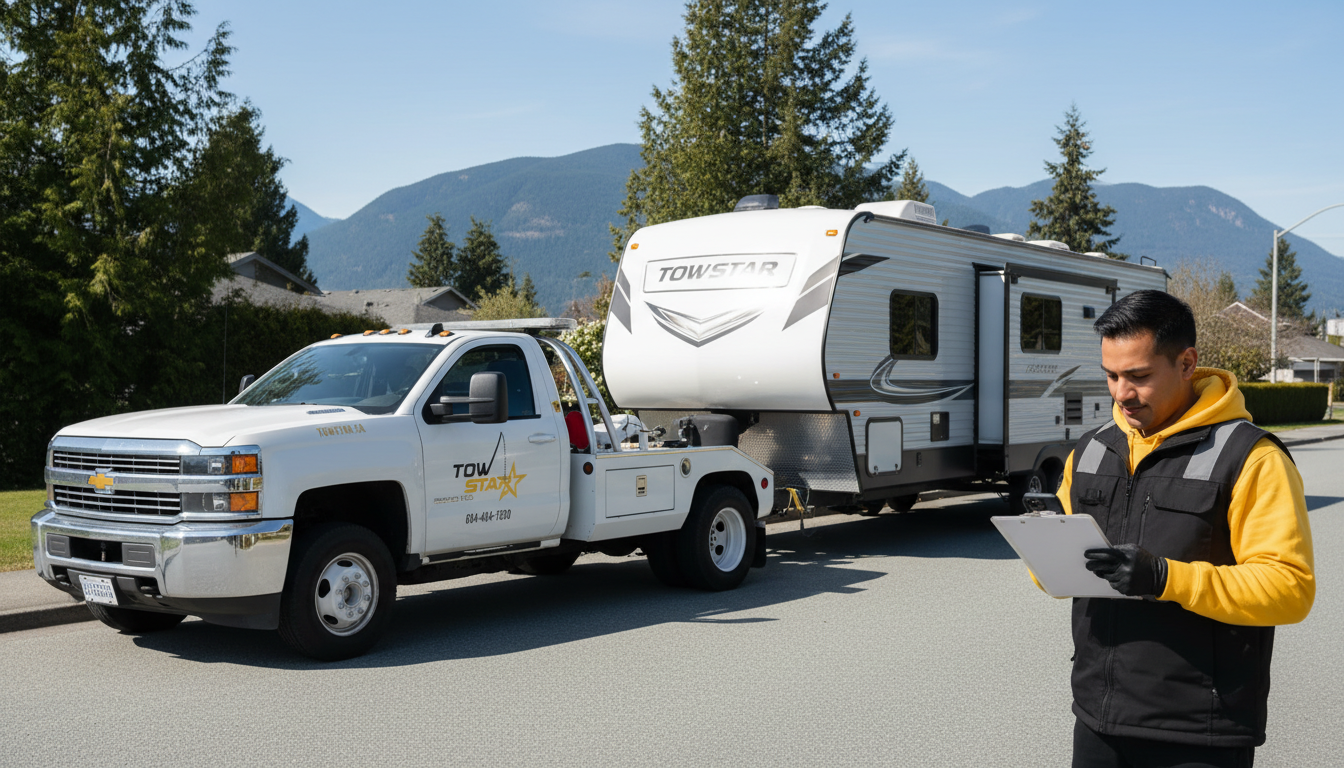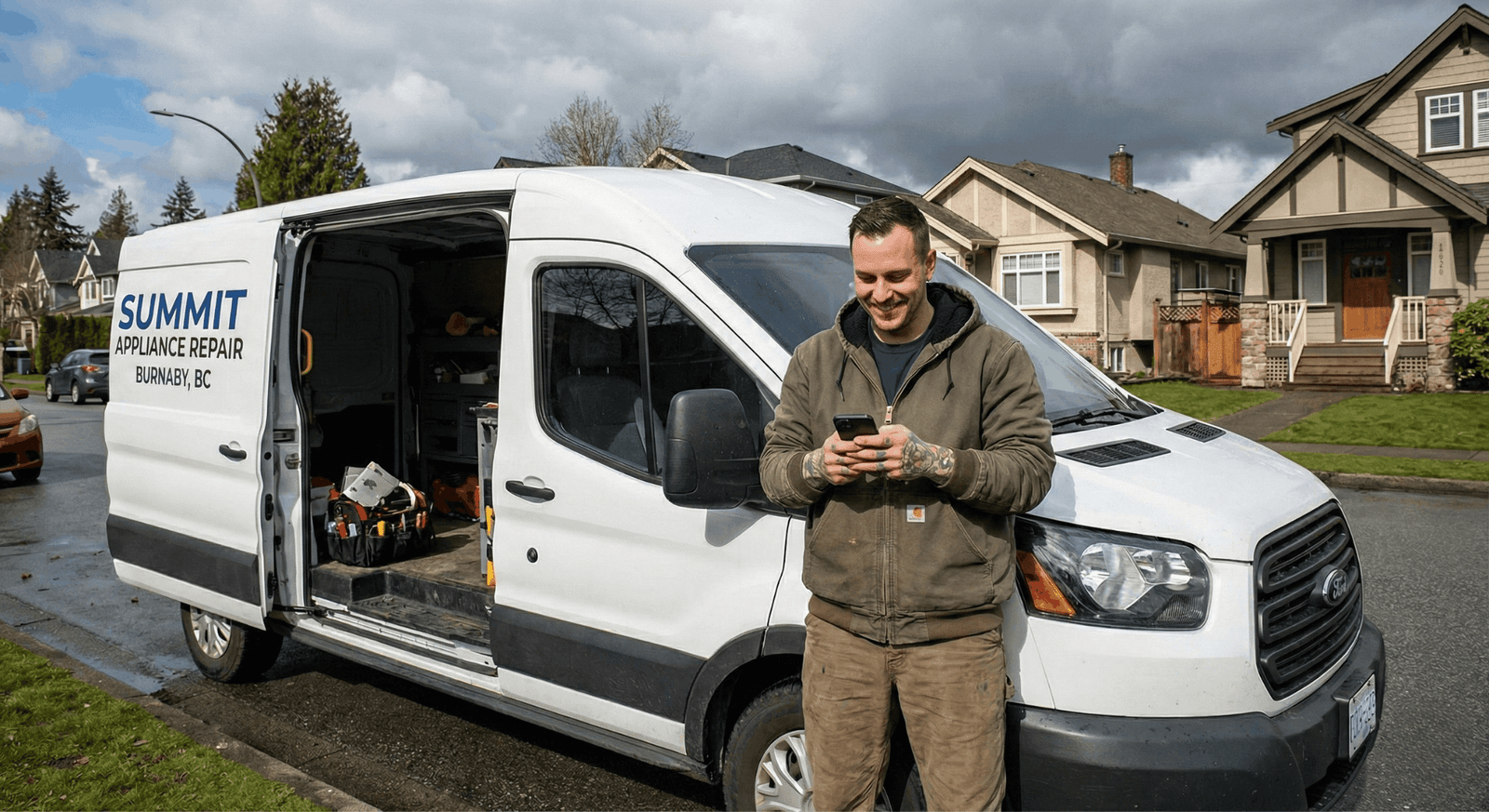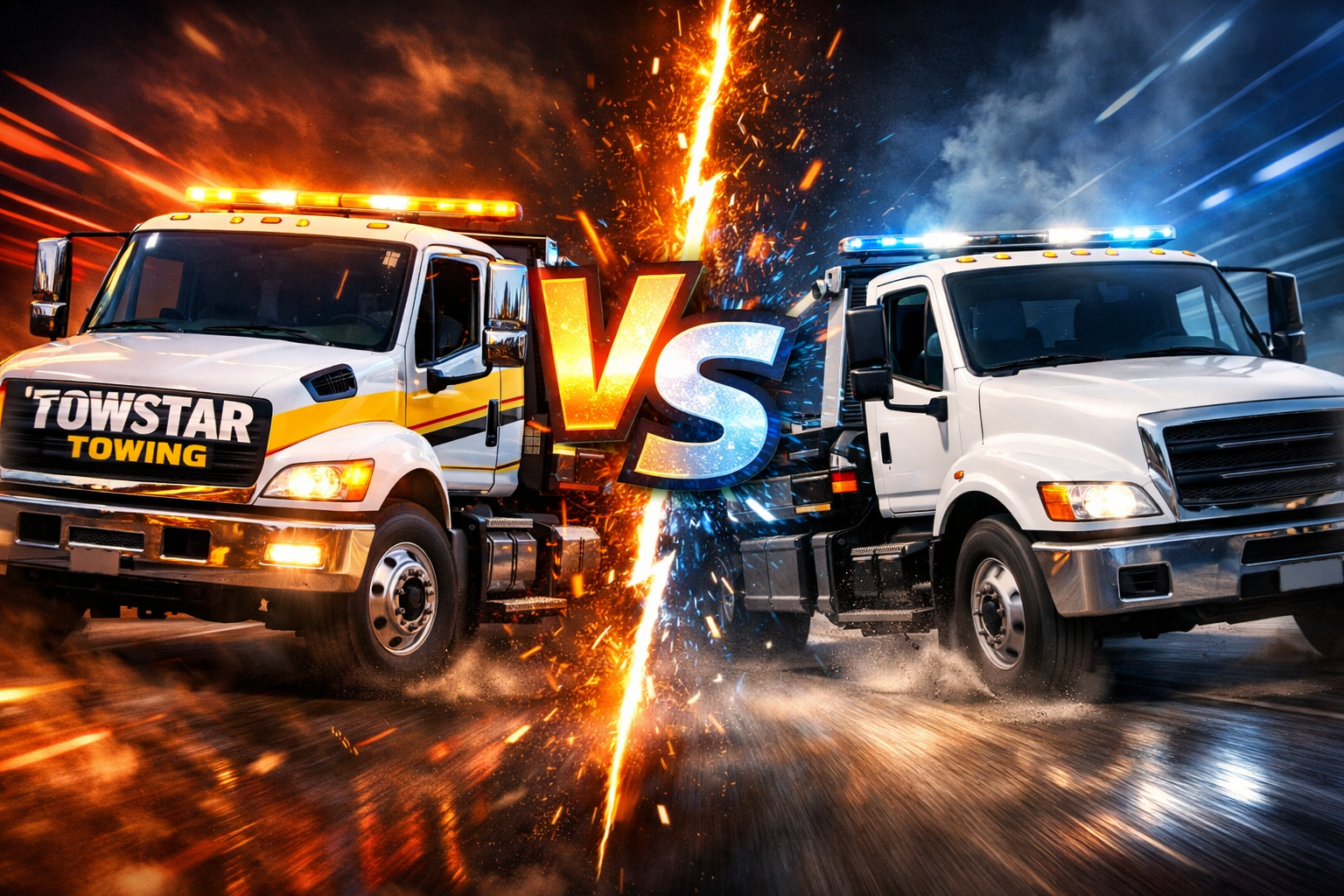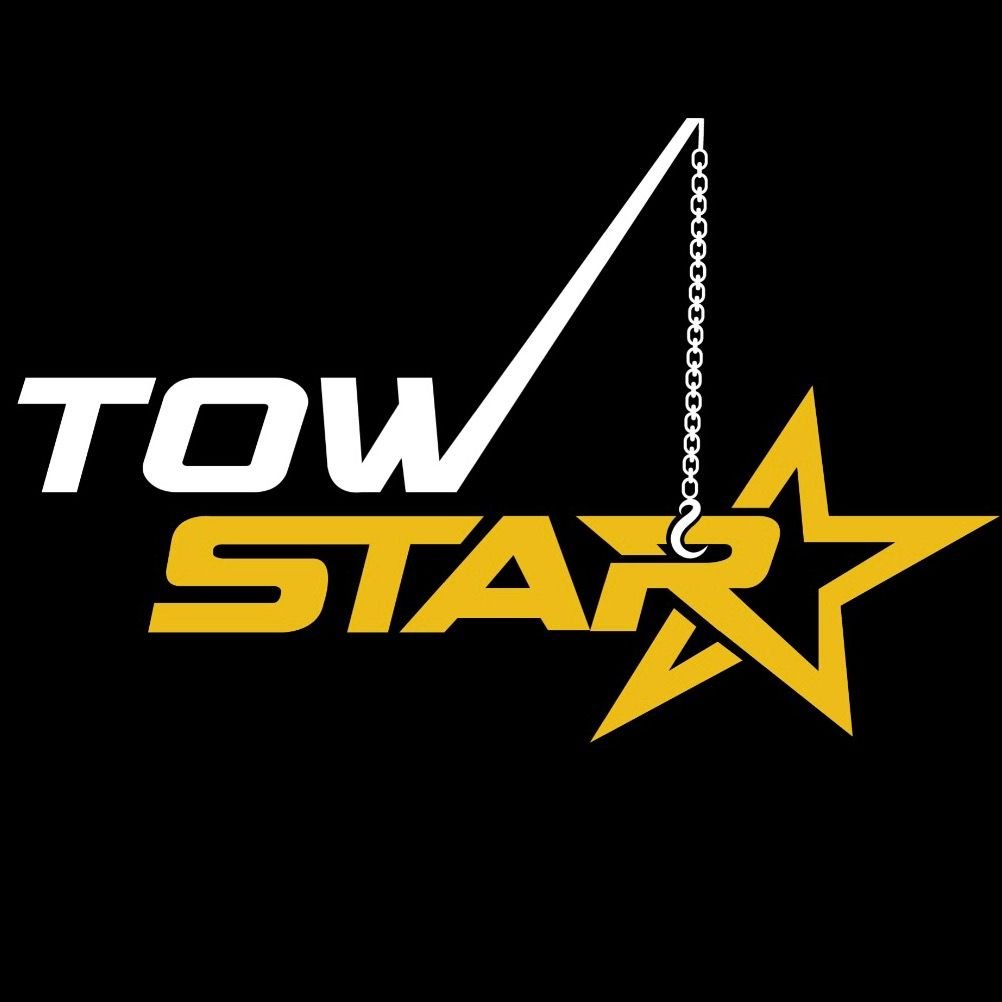Ever wondered why towing rules in Vancouver are strict? You’re not alone. Figuring out towing weight limits and restrictions can be tough. But it’s key for safety and following the law. Whether you’re towing a trailer or need towing services in Vancouver, knowing these rules is vital.
In this guide, we’ll cover towing in Vancouver. We’ll talk about legal weight limits and safety. You’ll learn how to figure out your vehicle’s towing capacity and deal with Vancouver’s roads. Plus, we’ll show you how to avoid hazards and legal problems.
Tow truck services in Vancouver are important for road safety and smooth traffic. Prices start at $65 for simple tasks and can reach $500 for complex ones. The average cost for a local tow (up to 10 km) is between $75 and $125. Knowing these cost roadside services such as Car Lockout Services or towing helps you make smart choices when you need help.
Vancouver’s towing rules cover many situations, like parking fines, abandoned vehicles, and unsafe ones. The fines for breaking these rules can add up fast. We’ll look at different towing classifications by weight and their fees. This will help you understand what to expect if you need towing services.
Key Takeaways
- Towing weight limits are key for safety and following the law in Vancouver
- Knowing your vehicle’s towing capacity is vital before towing any load
- Vancouver towing services offer different prices based on the job’s complexity
- Towing rules in Vancouver cover many situations, from parking fines to unsafe vehicles
- Learning about towing classifications and fees helps you make better choices
Introduction to Towing in Vancouver
Towing in Vancouver is vital for keeping the city moving. It helps with breakdowns or moving recreational vehicles. Knowing towing limits is essential for safe travel.
The Importance of Understanding Towing Limits
Understanding towing limits is more than just following rules. It’s about safety on Vancouver’s busy streets. Towing too much can lead to accidents and fines. It also increases your insurance costs.
“Knowledge is power when it comes to towing. Knowing your limits can save lives and money.”
Common Towing Scenarios in Vancouver
Vancouver faces many towing needs. You might need flatbed towing for a car that won’t start. Or, you might need to tow a trailer for moving. Boat owners also need towing to reach the water.
About 2,000 RVs get impounded yearly in BC. Knowing the rules is key. Whether it’s roadside assistance or a big move, being informed helps avoid road troubles.
| Towing Scenario | Common in Vancouver | Requires Professional Help |
|---|---|---|
| Car Breakdown | Yes | Often |
| RV Transport | Seasonal | Recommended |
| Boat Towing | Yes | Sometimes |
| Moving Trailer | Yes | Depends on size |
Legal Towing Weight Limits in Vancouver
It’s important to know the towing weight limits in Vancouver for safe towing. We’ll look at the rules for different vehicle types in British Columbia.
Provincial Regulations Governing Towing
In Vancouver, towing rules are strict and depend on vehicle size. Cars, pickups, and vans can tow up to 2,999 kg. Medium trucks can tow between 3,000 to 6,300 kg. Large trucks can tow from 6,301 to 9,072 kg. For heavy loads, heavy duty towing Vancouver services handle vehicles over 9,072 kg.
Vehicle Classifications and Their Limits
Knowing your vehicle’s class is key for safe towing. Here’s a look at towing fees based on vehicle weight:
| Vehicle Weight | Base Towing Fee | Fuel Surcharge (First 6 km) |
|---|---|---|
| Regular-sized (≤2,999 kg) | $82.18 | $22.19 |
| Medium-sized (3,000-6,300 kg) | $86.78 | $23.43 |
| Large-sized (6,301-9,072 kg) | $137.58 | $37.15 |
| Heavy (≥9,073 kg) | $182.98 | $49.90 |
For long distance towing in Vancouver, extra fees apply. The distance surcharge for tows over 6 km varies. It’s $2.41 per km for regular vehicles and $7.26 per km for heavy trucks. Remember these limits and fees for safe and legal towing in Vancouver.
Factors Influencing Towing Capacity
Understanding what affects your vehicle’s towing capacity is key in Vancouver. Whether for a camping trip or accident towing, knowing these factors ensures safe towing.
Vehicle Make and Model
Your vehicle’s make and model greatly influence its towing capacity. For instance, a midsize SUV can tow around 5,000 pounds. A heavy-duty truck can tow up to 15,000 pounds or more. Here’s a quick look at some popular models and their towing strengths:
| Brand | Model | Towing Strength |
|---|---|---|
| Ford | F-150 | Exceptional power for various needs |
| Chevrolet | Silverado | Diverse capabilities across lineup |
| Ram | 1500 | Outstanding for diverse scenarios |
| Jeep | Grand Cherokee | Strong off-road and practical towing |
Trailer Type and Weight
The type and weight of your trailer affect your towing capacity. To find your towing limit, subtract your truck’s curb weight from its Gross Combined Weight Rating (GCWR). For example, if your pickup has a GCWR of 12,000 pounds and weighs 5,000 pounds, your towing capacity would be 7,000 pounds.
Load Distribution
Safe towing depends on proper load distribution. Uneven loading can cause swaying and accidents. Remember, adding weight to your payload reduces your towing capacity. Always stay within your vehicle’s Gross Combined Weight Rating to avoid accidents.
Always check your owner’s manual for towing guidelines. If unsure about your vehicle’s capacity or need impound lot services Vancouver, seek professional advice.
Importance of Properly Classifying Your Vehicle
Knowing your vehicle’s class is vital for safe towing in Vancouver. It prevents overloading and prepares you for winch out services. Let’s explore the key terms and their effect on towing. Understanding your vehicle’s class not only helps you choose the right towing equipment but also minimizes the risk of car breakdown reasons in Vancouver, such as excessive weight or improper load distribution. By familiarizing yourself with the specifications of your vehicle and trailer, you can ensure a smoother and safer towing experience. Additionally, being aware of local regulations and towing capabilities allows you to make informed decisions that enhance your overall driving safety.
Understanding GVWR and Curb Weight
GVWR means Gross Vehicle Weight Rating. It’s the max weight your vehicle can handle, including everything inside. Curb weight is your vehicle’s empty weight. The gap between these two shows your vehicle’s cargo capacity.
For instance, most recreational trailers are under 4,600 kg. Towing within this range requires a Class 5 or 7 licence. But, for heavier loads, you’ll need more endorsements.
Impact on Towing Capability
Your vehicle’s class greatly influences what you can tow safely. Always check your owner’s manual for the max towing weight. Towing over this limit is risky and against the law. Remember, proper classification is about safety, not just weight.
If unsure about your vehicle’s towing capacity, seek professional advice. They can teach you safe towing practices. They might also offer cash for cars Vancouver if your vehicle isn’t suitable for towing.
Proper classification prepares you for Vancouver’s diverse road conditions. It ensures control, even on steep hills or sudden weather changes. By knowing your vehicle’s limits, you’re not just following the law. You’re also keeping everyone on the road safe.
Safety Considerations When Towing
Towing in Vancouver needs careful attention to safety. Whether you’re hauling a trailer or getting roadside assistance in Vancouver, knowing key safety measures is key. It’s essential to ensure that your towing equipment is properly maintained and that your vehicle is equipped with the necessary safety features. Additionally, drivers should always be prepared for emergency car troubles in Vancouver, as unexpected situations can arise at any moment. Familiarizing yourself with local towing regulations and having a reliable roadside assistance plan can help mitigate risks and enhance overall safety on the road. It’s essential to ensure that your vehicle is properly equipped for towing, with appropriate hitching and weight distribution to avoid accidents. Additionally, familiarizing yourself with the local regulations surrounding towing can prevent legal issues and ensure a smoother experience. For those who require professional help, there are various towing services in Vancouver that can provide expert assistance and guidance.
Essential Safety Checks Before Towing
Before you start, do these important checks:
- Inspect hitch connections
- Check safety chains
- Test trailer lights and brakes
- Verify tire pressure on both vehicles
- Ensure proper load distribution
Common Hazards to Anticipate
Be ready for these possible challenges:
- Trailer sway
- Sudden stops
- Steep hills
- Tight turns
- Adverse weather conditions
Vancouver Towing experts say practice in quiet areas to feel more confident. Also, all towed vehicles with a ball hitch must have safety chains or cables.
| Vehicle Type | Brake Requirement | Maximum Length |
|---|---|---|
| Trailers (GVW > 1,400 kg) | Brakes on all wheels | 12.5 m (41 ft) |
| Motor homes | Brakes for towed vehicles ≥ 2,000 kg | 14.0 m (45.93 ft) |
| Fifth Wheel Trailers (GVW | Varies | 14.65 m (48 ft) |
By sticking to these tips, you’ll have a safer towing experience in Vancouver’s varied driving conditions.
Vancouver’s Road Conditions and Towing
Driving in Vancouver is unique, with challenges when towing. The city’s varied landscape and weather require drivers to be alert and ready. Here’s how to safely navigate Vancouver’s roads while towing.
Navigating Urban Roads
Vancouver’s busy streets need extra care when towing. Tight turns and heavy traffic make it hard to maneuver. Keep these tips in mind: When towing in Vancouver, it’s essential to stay vigilant for potential overheating vehicle issues in Vancouver, especially during peak traffic hours. Make sure your vehicle is well-maintained, as the stop-and-go nature of the city can strain both towing and towed vehicles alike. Additionally, always check your tow capacity and ensure that your equipment is suited for the job to avoid any unwanted breakdowns. It’s essential to assess the situation carefully before attempting to tow a vehicle in these conditions. For those unexpected breakdowns, consider exploring flat tire towing options in Vancouver, as they can provide a more convenient solution without adding to the chaos of traffic. Always prioritize safety and ensure you’re following local regulations to make the towing process smoother for everyone involved.
- Plan your route in advance
- Use wider turning radiuses
- Be aware of height restrictions
- Allow extra space between vehicles
If towing is hard, think about using flatbed towing Vancouver services. They’re pros at getting through tight spots.
Handling Steep Hills and Weather Challenges
Vancouver’s hills and changing weather can surprise drivers. Here’s how to stay safe:
- Use lower gears when going downhill
- Check your brakes regularly
- Install winter tires during colder months
- Keep chains handy for snowy conditions
Remember, tow truck services Vancouver are ready 24/7 if you need help. Don’t hesitate to call for professional assistance when needed.
| Road Condition | Safety Tip |
|---|---|
| Steep Hills | Use engine braking |
| Icy Roads | Reduce speed, increase distance |
| Heavy Rain | Check wipers, use headlights |
| Fog | Use fog lights, reduce speed |
Understanding Vancouver’s local challenges helps you tow safely. Stay updated on road conditions and always put safety first when towing.
Choosing the Right Tow Vehicle
Finding the right tow vehicle is essential for safe and efficient long distance towing in Vancouver. When searching for a vehicle for heavy duty towing, consider several important features.
Key Features to Look For
Engine power is a top priority. A strong engine helps your vehicle tackle steep hills and heavy loads. The type of transmission is also important. Automatic transmissions with tow/haul mode are ideal for city driving.
Braking systems are critical for safety. They help control your vehicle when towing.
The gross combined weight rating (GCWR) is another key factor. It’s the maximum weight set by the manufacturer. This includes your tow vehicle, RV, cargo, and passengers. It’s important to stay within this limit for safety and legal reasons.
Recommendations for Popular Models
For trucks, the Ford F-150 and Ram 1500 are excellent choices. They offer strong towing capacity and comfort. If you prefer SUVs, the Chevrolet Tahoe and Toyota Sequoia are good options. These models perform well in both city driving and long trips.
Motor homes have unique towing capabilities. They can tow vehicles via a tow bar without brakes if the towed vehicle weighs less than 2,000 kg. This makes them versatile for long trips.
Practice is key. Start practicing your towing skills weeks before a big trip. Focus on reversing, braking, parking, and turning. It’s best to practice on the highway when it’s quiet.
The Role of Professional Towing Services
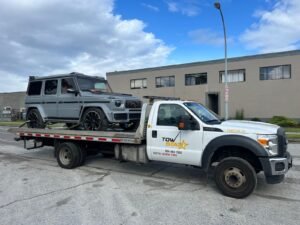
Knowing when to call for towing help in Vancouver is key. Professional towing services have the expertise needed for tough situations. Whether you’ve experienced a breakdown, a flat tire, or a vehicle accident, prompt action can save you time and stress. Understanding the benefits of advance towing services can greatly enhance your peace of mind, as these services often provide quick response times and reliable support in emergencies. Additionally, they can assist with roadside problems beyond just towing, ensuring you’re back on the road as soon as possible. Whether you find yourself stranded on the side of the road due to a breakdown or involved in an accident, timely assistance can make all the difference. By relying on reputable tow truck services in Vancouver, you ensure that trained professionals will swiftly and safely handle your vehicle’s needs. This not only alleviates stress but also helps prevent further damage to your car.
When to Call for Professional Help
Call pros for heavy vehicles or complex issues. If your trailer is over 4,600 kg GVW, it’s time to call. They’re also essential for accident towing in Vancouver, where safety matters most.
Benefits of Experienced Towing Services
Experienced towing services offer many benefits. They have the right tools and know-how for tough jobs. They also know local rules and can navigate Vancouver’s streets easily.
They’re your best choice for impound lot services in Vancouver. This saves you time and stress.
| Service | Benefit |
|---|---|
| 24/7 Availability | Help anytime, day or night |
| Quick Response | On-scene within 30-60 minutes |
| Insurance Coverage | Extra protection during towing |
| Specialized Equipment | Right tools for any job |
Choosing a professional service means peace of mind. They have the skills and gear for any job. If unsure, it’s best to call the pros for your safety and vehicle’s safety on Vancouver’s roads.
Conclusion and Best Practices
As we finish our guide on towing weight limits and restrictions in Vancouver, let’s go over the main points. Safety is the most important thing when towing in this busy city. Choosing the right vehicle and tow company, distributing the load correctly, and following local rules are key for a safe towing experience.
Recap of Towing Guidelines
In Vancouver, towing rules are very strict. Only licensed companies can tow from private property. The base cost for towing regular vehicles starts at $82.18 in 2025. Storage fees range from $25.18 to $75.54 daily.
It’s important to have clear signs and proper notice before towing. This is a legal requirement.
Final Thoughts on Safe Towing in Vancouver
Know the local towing laws and your vehicle’s limits well. Regular maintenance can help avoid breakdowns, which are a big reason for towing calls. If you need winch out services in Vancouver, act quickly to avoid more damage.
If you’re looking to upgrade, consider cash for cars Vancouver options. This can help you get a better towing vehicle.
Towing services in Vancouver are available 24/7 to help you. It’s also important to have the right insurance. Sadly, 70% of Vancouver drivers don’t check their policies every year. Stay ready and tow safely in Vancouver.
FAQ
What’s the legal towing weight limit in Vancouver?
The towing weight limit in Vancouver varies based on your vehicle’s type and GVWR. Always check your vehicle’s manual or talk to a professional to find out your limit. Remember, towing more than allowed is dangerous and illegal.
How do I know my vehicle’s towing capacity?
Your vehicle’s towing capacity is listed in the owner’s manual or on the driver’s side door jamb. Consider your vehicle’s make, the trailer type, and load distribution when figuring out your actual towing capacity.
What safety checks should I perform before towing in Vancouver?
Before towing, check your hitch, safety chains, trailer lights, and brakes. Make sure your load is balanced and secure. Adjust your mirrors and get used to towing your vehicle.
How do Vancouver’s road conditions affect towing?
Vancouver’s hills and weather can make towing tough. Be ready for sudden weather changes, like in winter. Use caution on hills and consider chains when needed. Also, watch out for tight spaces and heavy traffic in the city.
When should I call for professional towing services in Vancouver?
Call for professional towing for heavy-duty, accident recovery, or if unsure about towing yourself. They’re also good for long trips or tricky roads.
What’s the difference between GVWR and curb weight?
GVWR is the max weight a vehicle can carry, including itself, passengers, cargo, and trailer tongue weight. Curb weight is the vehicle’s weight alone. Knowing both is key for safe towing.
Are there specific regulations for towing a boat in Vancouver?
Yes, towing a boat in Vancouver has its own rules. Make sure your vehicle can tow the boat’s weight. Use the right tie-downs and be aware of how towing affects your vehicle’s handling. Secure loose items in the boat before towing.
How does load distribution affect towing safety?
Proper load distribution is vital for safe towing. Aim for 60% of the weight in the trailer’s front half and 40% in the rear. Improper distribution can cause trailer sway and affect steering and braking. Always balance your load before driving.
What should I do if my trailer starts swaying while towing?
If your trailer sways, don’t panic or brake hard. Slow down by easing off the gas. Hold the steering wheel steady and avoid sharp turns. Once slowed, pull over and check the load if needed.
How often should I have my towing equipment inspected?
Inspect your towing equipment at least once a year or before a long trip. Regular checks can spot wear on hitches, couplings, and electrical connections. This can prevent roadside emergencies.
